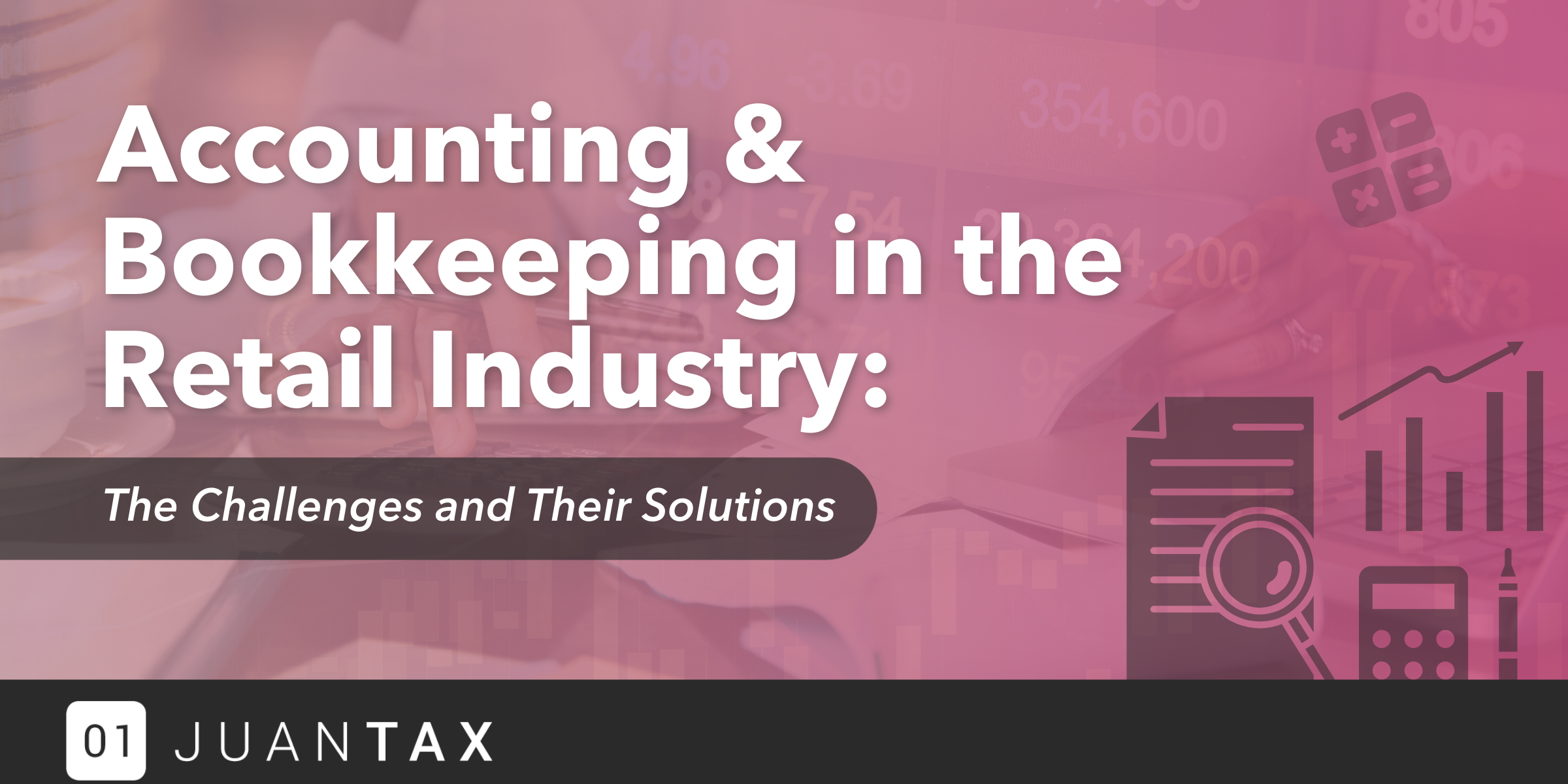Over the years, the retail industry has grown immensely as it continues to adapt and embrace digital transformation. The increasing popularity of e-commerce, or online shopping these days, makes day-to-day operations even busier than usual, especially when it comes to keeping a closer eye on business financial information.
While it’s crucial for any type of business to keep an accurate and up-to-date record of all their transactions, the retail sector is often more complex and faces unique challenges in terms of accounting, bookkeeping, maintaining proper financial statements, and handling taxes.
With a higher volume of transactions they process on a regular basis, such as sales, purchases, payroll, bank entries, inventories, and so on, retail businesses are undoubtedly having difficulty managing all of these at the same time.
Enhancing Retail Business Performance: Understanding the Fundamental Roles of Accounting and Bookkeeping
To fully appreciate the complexities and nuances of accounting and bookkeeping in the retail industry, it is essential to first define the fundamental concepts of retail accounting and bookkeeping, and understand their vital roles in the sector.
Retail accounting is the process of recording and analyzing financial transactions specific to the retail industry. It involves tracking sales, inventory, and expenses, along with other financial data, to provide accurate and up-to-date financial information. This information is then used by businesses to make informed decisions, measure financial performance, and comply with legal requirements.
Bookkeeping, on the other hand, is the systematic recording, categorizing, and organizing of financial transactions that form the foundation of accounting. It involves maintaining detailed and accurate records of all financial transactions, such as purchases, sales, and payments, in a consistent and organized manner.
In the retail industry, accounting and bookkeeping play crucial roles in ensuring business success and sustainability. They provide accurate and timely financial information that helps retailers monitor their cash flow, optimize inventory management, and track profitability. They also enable businesses to comply with tax laws, financial reporting standards, and other regulations.
Retail accounting also serves as a tool for complying with legal and regulatory requirements, such as tax laws and financial reporting standards. It ensures that retail businesses operate ethically and transparently, maintaining the trust and confidence of stakeholders and customers alike. In short, retail accounting is an indispensable aspect of running a successful and sustainable retail business.
Furthermore, accounting and bookkeeping help retailers make informed decisions regarding pricing strategies, product offerings, and supply chain management. By providing real-time financial information, they allow businesses to identify trends and patterns in consumer behavior and adjust their operations accordingly.

So, what are some of the most common accounting challenges that retail businesses encounter on a daily basis?
1. Poor tax compliance
One of the significant challenges that bookkeeping and accounting professionals encounter in the retail industry is ensuring proper tax compliance. Due to the constantly changing tax regulations, many retailers may find it difficult to stay up-to-date with the latest tax laws and comply with them. As a result, retailers may fail to meet their tax obligations or submit their returns inaccurately, which can result in severe financial penalties, tarnished reputation, and even legal consequences.
Retailers have to stay vigilant and monitor tax-related changes regularly to ensure they are meeting all their tax obligations. Failure to do so can cause significant financial loss and hinder their business growth. It is essential for retailers to have a comprehensive understanding of tax laws, be up-to-date with the latest regulatory changes, and seek professional advice from qualified accountants and bookkeepers to avoid any non-compliance issues.
2. Cash flow mismanagement (payable and receivable accounts)
The retail industry’s cash flow can be affected by numerous factors, such as delayed payments, unpaid invoices, and unexpected expenses. This mismanagement of cash flow can lead to a variety of issues for businesses, including the inability to pay suppliers and employees, missed opportunities, and financial instability.
To tackle these issues, maintaining a positive cash flow has become a crucial task for retailers. Keeping track of invoices, payments, and accounts receivable and payable have become a laborious and time-consuming task, especially without the aid of automation. Without proper management of cash flow, retailers run the risk of not being able to meet their financial obligations and may struggle to maintain profitability in the long run.
3. Inconsistent reconciliation of financial statements
This issue arises when retailers fail to regularly produce financial reports due to the tedious nature of the process.
This is especially true when it comes to reconciling the cost-to-retail ratio, calculating the cost of goods sold using the FIFO method (“First In, First Out”), and keeping track of inventory purchases and sales to accurately prepare balance sheets.
The accounting process of reconciling financial statements involves carefully analyzing revenue and expenses to ensure they align with the actual financial situation of the business. However, due to the tedious nature of the process, retailers often fail to produce regular financial reports, resulting in inconsistencies in their financial records. This inconsistency can lead to a host of problems, including inaccurate financial reporting, tax implications, and legal issues.
To overcome this challenge, retail businesses need to prioritize the regular reconciliation of their financial statements. This can help them maintain an accurate and up-to-date record of their financial transactions, which is crucial for making informed business decisions. Additionally, leveraging technology and automation tools can help streamline the reconciliation process, reducing the time and effort required while also improving accuracy and consistency.
By regularly reconciling financial statements and leveraging technology, retail businesses can not only avoid costly errors but also gain better insights into their financial health, leading to improved decision-making and increased profitability.
4. Inefficient payroll processes
Conventional payroll processing methods often involve a great deal of paperwork, which is time-consuming, cumbersome, and prone to errors. The manual handling of employee data and information leaves room for human error, which can lead to inaccuracies in the payroll system. These inaccuracies can result in payment delays, incorrect tax filings, and even employee disputes. Additionally, payroll fraud is also a significant risk for businesses that rely on manual processes, which could eventually lead to hefty penalties.
Inefficient payroll processes can have far-reaching consequences for businesses, including low employee morale, legal issues, and damage to the company’s reputation. Retailers need to streamline their payroll processes to ensure they are efficient, accurate, and compliant with relevant regulations. By adopting modern payroll systems and automating manual processes, businesses can significantly reduce the time and effort required to process payroll. This will also reduce the likelihood of errors, improve transparency, and allow for better management of employee data.
Investing in efficient payroll processes can have significant benefits for retailers, including increased employee satisfaction, improved compliance, and more accurate financial reporting. By leveraging technology and automation, businesses can simplify their payroll operations and free up resources to focus on other critical aspects of their operations.
5. Improper inventory management
One of the critical challenges facing retail businesses in their accounting and bookkeeping practices is improper inventory management. The retail method of accounting, which is used to calculate the cost of goods sold, relies on accurate tracking of inventory purchases, physical inventory counts, and the average cost of inventory. Failure to manage inventory properly can lead to overstocking or understocking of products, resulting in lost sales, unhappy customers, and decreased profitability. Moreover, it can cause errors in financial reporting, tax filings, and other critical financial operations.
To effectively manage inventory, retail businesses must accurately track stock levels, monitor product demand, and forecast future sales. However, many retailers still rely on outdated systems that are time-consuming, error-prone, and lack features such as real-time inventory updates. To overcome this challenge, retailers must invest in modern inventory management systems that can optimize their inventory management processes. These systems can analyze sales data, monitor stock levels, and provide accurate inventory updates, allowing retailers to improve their profitability, reduce waste, and ensure that they have the right products in stock when their customers need them.
6. Unorganized paperwork/ unreliable data storage
Inefficient data storage systems and unorganized paperwork can make it challenging for retail businesses to manage their financial records effectively. This can result in inaccurate financial reporting, missed payments, and increased vulnerability to fraud and other financial irregularities. Additionally, disorganized paperwork and data storage can make it difficult for businesses to access critical financial information when they need it, leading to delays in decision-making and inefficient use of resources.
To address these challenges, retailers need to invest in modern data storage systems and adopt best practices for organizing their financial records. This includes digitizing paperwork, implementing robust data storage systems, and leveraging technology to automate manual processes. By doing so, businesses can improve their financial reporting, reduce the risk of errors and fraud, and ensure that critical financial information is easily accessible when needed.

Boost Your Retail Business with JuanTax Plus: How Automated Bookkeeping and Tax Compliance Solutions Can Streamline Your Business Processes
JuanTax Plus is a comprehensive bookkeeping and tax compliance solution that is designed to cater to the needs of many industries including retail businesses. It offers a range of powerful features that can help retailers to automate their bookkeeping and accounting processes, streamline tax preparation, and ensure that their financial records are accurate and up-to-date.
- Automated Books of Accounts
One of the key benefits of JuanTax Plus is its automated books of accounts feature. This feature tracks all retail business sales, expenses, payables, receivables, and other financial information in an automated ledger or journal. By automating these processes, retailers can save time, reduce errors, and ensure that their financial records are always accurate and up-to-date.
- Timely Financial Reports
Another significant benefit of JuanTax Plus is its ability to generate timely and insightful financial reports. With just a few clicks, retailers can get an accurate, real-time depiction of their business’s financial health. This can help them to make informed decisions, identify areas for improvement, and optimize their financial performance.
- Accurate Tax Preparation
JuanTax Plus also offers accurate tax preparation functionality, which can help retailers to seamlessly file and pay their taxes online directly to the BIR. This can save retailers time and effort, reduce the risk of errors, and ensure that they are always compliant with tax regulations.
- Experienced and professional support and training for accounting, bookkeeping, and JuanTax-related concerns
It provides experienced and professional support and training for accounting concerns. With reliable chat support and accessible self-learning online courses for FREE, retailers can ensure that their bookkeeping and tax preparation is done correctly and efficiently.
- High level of cyber security with MFA functionality
Finally, JuanTax Plus offers a high level of cyber security with MFA functionality. This can help retailers to protect their sensitive financial information from cyber threats and ensure that their data is always safe and secure.

Join Thousands of Satisfied Users: Sign Up for JuanTax Today!
Revolutionize your retail business’s financial management with JuanTax – the cloud-based solution that simplifies bookkeeping and tax compliance processes. Sign up today to streamline your accounting practices and experience accurate, real-time financial reporting at your fingertips! Visit us at JuanTax.











